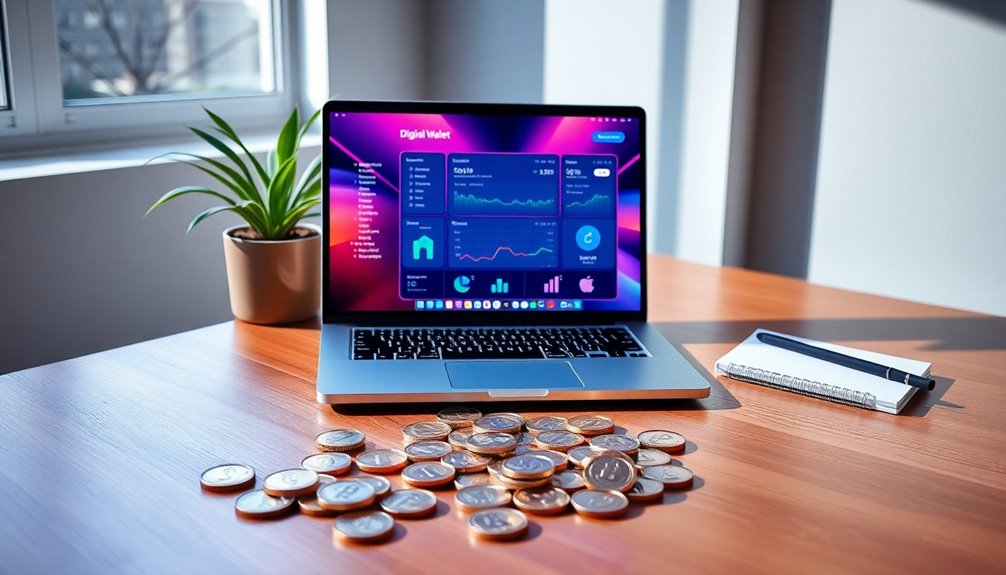A self-custodial wallet gives you complete control over your crypto assets, letting you manage your digital wealth without relying on third parties. You hold your private keys, which are vital for accessing your funds and authorizing transactions. This type of wallet enhances your security by reducing risks from hacks. While it requires some technical know-how, the benefits of decentralization and autonomy often outweigh the challenges. Ready to learn more about securing and managing your assets effectively?
Key Takeaways
- A self-custodial wallet allows users full control over their private keys, securing access to their cryptocurrency assets.
- These wallets reduce reliance on third parties, minimizing the risks of hacks and unauthorized access.
- Users are responsible for the security and backup of their private keys, as loss can lead to irretrievable funds.
- Self-custodial wallets come in various forms, including hardware, software, and paper wallets, catering to different security needs.
- They empower users to manage their assets according to personal preferences, enhancing engagement within the cryptocurrency ecosystem.

As cryptocurrencies continue to gain popularity, understanding how to securely manage them becomes essential. One of the most effective ways to ensure the safety of your digital assets is through a self-custodial wallet. This type of wallet gives you complete control over your private keys, which are crucial for authorizing transactions and accessing your funds. Unlike custodial wallets that store your keys on centralized servers, self-custodial wallets empower you to manage your assets without relying on third parties, thereby reducing the risk of hacks and mismanagement. It’s important to understand the various options available when exploring self-custodial wallets, as each provides different features and levels of security. For those new to the world of digital currencies, a crypto wallet explained can clarify the functions and benefits of using such wallets over traditional banking methods. By utilizing a self-custodial wallet, you not only enhance your security but also take full ownership of your financial future, making informed decisions without external interference.
Self-custodial wallets come in various forms, including hardware, software, and even paper wallets. Each type offers unique characteristics and varying levels of security, allowing you to choose what best fits your needs. With a self-custodial wallet, you enjoy decentralized control over your digital assets, a principle fundamental to the cryptocurrency space. You're not just a user; you're the owner, which brings a sense of autonomy that many enthusiasts appreciate. Self-custody wallets also enable participation in a broader range of blockchain activities, enhancing your engagement with the crypto ecosystem.
However, this control comes with responsibilities. You're solely accountable for the security and backup of your private keys. If you lose access to them or if your wallet file is compromised, you may not be able to recover your funds. This reality can be daunting, especially for beginners who might find the technical aspects of managing a self-custodial wallet overwhelming.
You'll need to invest time in learning best practices for security and backup to ensure that your assets remain safe. To navigate the complexities, start with some best practices. First, use strong passwords that include a mix of uppercase and lowercase letters, digits, and special characters. Implementing two-factor authentication (2FA) adds another layer of security by requiring additional verification through your mobile device. Biometric locks, like Face ID or fingerprint authentication, can further enhance your wallet's security.
Regular backups of your private keys and seed phrases are also critical; this helps prevent loss of access in case your device gets lost or damaged. Moreover, consider the multi-blockchain compatibility many self-custodial wallets offer. This feature allows you to manage a variety of cryptocurrencies in one place, simplifying your experience.
While it's true that self-custodial wallets require a higher level of technical understanding, the benefits often outweigh the challenges. You gain customizability and the ability to manage your assets as you see fit, bringing peace of mind that your cryptocurrency is secure.
Frequently Asked Questions
Are Self-Custodial Wallets Safe From Hacks and Scams?
Self-custodial wallets aren't completely safe from hacks and scams, but you can take steps to enhance their security.
By using strong passwords and enabling two-factor authentication, you can protect your funds. Additionally, consider using hardware wallets that keep your private keys offline, minimizing online threats.
Regularly backing up your wallet data is crucial too, ensuring you can recover your assets if something goes wrong.
Stay informed about risks to safeguard your investments.
Can I Recover My Assets if I Lose My Wallet?
Imagine locking your valuables in a safe and losing the key—it's a nightmare, right?
If you lose your wallet, recovering your assets is nearly impossible. Without centralized recovery options, you're solely responsible for your private keys and recovery phrases.
If you misplace them, your funds are irretrievable. To avoid this, securely store and back up your keys.
Do Self-Custodial Wallets Support All Cryptocurrencies?
Self-custodial wallets don't support all cryptocurrencies, but they do cover many major ones like Bitcoin and Ethereum.
You’ll find that wallets such as Trezor, Ledger, and Trust Wallet allow you to manage popular coins and a wide range of ERC-20 tokens. These wallets not only provide enhanced security for your assets but also support seamless transactions across various platforms. As you explore different wallets, it’s essential to consider compliance aspects, especially regarding exchanges or services that require identity verification—this is where the question often arises: what is KYC in crypto? Understanding KYC, or Know Your Customer, helps individuals navigate the requirements for using certain crypto services while ensuring they comply with regulatory standards.
Additionally, some wallets even handle NFTs and other digital assets.
It's crucial to check specific wallet compatibility before choosing one to ensure it meets your needs.
How Do Transaction Fees Work With Self-Custodial Wallets?
Think of transaction fees as the tolls on your crypto journey. When you move your assets, you pay network fees that fluctuate based on traffic—essentially, how busy the blockchain is.
You'll also encounter various other charges like processing and gateway fees.
With a self-custodial wallet, you gain clarity: you'll see a detailed fee breakdown before confirming, allowing you to navigate costs wisely and adjust settings for a smoother, cost-effective experience.
Are There Any Limits on Transactions With Self-Custodial Wallets?
There aren't any specific limits on transactions with self-custodial wallets.
You have full control over your funds, allowing you to send as much as you want without needing approval from a centralized exchange.
While you won't face transaction limits, you'll need to consider network fees, which can fluctuate based on blockchain activity.
Just remember, if your transaction exceeds €1,000 in the EU, identity checks may apply.
Conclusion
In the realm of crypto, a self-custodial wallet is your fortress, standing tall against the tides of uncertainty. By taking charge of your assets, you're not just a passive observer; you're the captain of your digital ship, steering it through both calm and stormy seas. Embrace the empowerment that comes with self-custody—your crypto journey is yours to navigate. So, why let someone else hold the compass when you can chart your own course?









